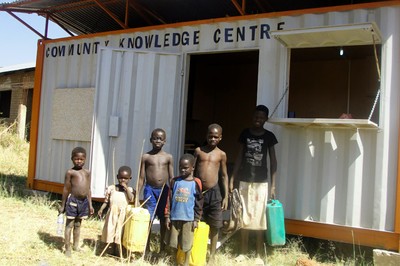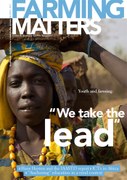Provocation seminars: The development community is embracing market-based approaches for reducing poverty among small-scale famers. But how exactly do we make markets work for the poor? A series of “provocation” seminars is challenging conventional wisdom on how to include smallholders in markets and bringing fresh perspectives to the discussion on what works and why.
“The political tendency of ‘making markets work for the poor’ leads to a fragmented enabling environment for smallholders.”
The idea of “pro-poor markets”is increasingly talked about in development policy, practice and research. Researchers study value chains and their benefits for the poor. Nongovernmental organisations work with smallholder organisations to build links with companies. Businesses work with civil society organisations to help farmers comply with standards so that they can become suppliers. And governments back programmes to get small-scale farmers into global value chains or regional trade.
Provocations
Between September 2010 and September 2011, the International Institute for Environment and Development (IIED), Hivos and collaborating organisations are hosting a travelling series of provocation seminars across Europe, to stimulate the debate on pro-poor markets.
The “provocations” will look at some of the big assumptions, impacts, benefits and risks of approaches taken by the development community to “make markets work” for small-scale farmers. For example, challenging the belief that by “making markets work for the poor”, small-scale farmers can survive and even prosper in the face of major changes ushered in by globalisation, economic liberalisation, and the partial withdrawal of the state. What are the risks in this approach? Is business a fickle ally of the poor-just the latest “social responsibility” fashion?
Provocation partners
Collaborating institutions working on the provocations include: • Centre for Learning on Sustainable Agriculture (ILEIA) • Empowering Smallholder Farmers in Markets (ESFIM) • Hivos • Institut de Recherches et d’Applications des Méthodes de développement (IRAM) • Institute for Development Policy and Management (IDPM), University of Manchester • International Institute for Environment and Development (IIED) • Mainumby • Netherlands Development Organisation (SNV) • Swedish International Agricultural Network Initia-ive (SIANI) • UN Research Institute for Social Development (UNRISD) • Vredeseilanden
The seminars will provide new and challenging insights-grounded in work with small-scale farmers in the developing world-to “provoke” those working in the area of smallholders and markets to re-think how we can make markets work for the poor.
Agency and agendas
The first provocation, held in the Hague in September 2010, stimulated debate on the links between market-based development and citizen empowerment as ways to connect small-scale farmers to markets.
Central to both market-based and citizen empowerment approaches is the idea of “producer agency”. In market-based development, this idea is generally described as the bringing together of smallholders into organisations or cooperatives that can link to private buyers and value chains. In empowerment approaches, agency means the capacity of small-scale farmers to take charge of their own development—to reflect on and shape the agenda for pro-poor markets to better suit their needs.
It is commonly accepted that by coming together in effective organisations, small-scale farmers can better engage in markets and improve their incomes. The problem with this assumption—that farmers can cooperate to compete—is that it turns a blind eye to the fact that the majority and poorest of small-scale farmers are not organised and do not represent a strong lobby. And that in many parts of the developing world, markets are still dominated by the elites and cartels that have economic and political clout.
Food for thought
The Hague provocation heard speakers pose key questions, identify major hurdles and suggest practical action. “The idea… is to develop and deepen existing knowledge and develop new insights and seek linkages between the two approaches, of linking producers to markets and of civic-driven change.” Carol Gribnau, Hivos, The Netherlands.
“The political tendency of ‘making markets work for the poor’ leads to a fragmented enabling environment for smallholders.” Giel Ton, Wageningen UR, The Netherlands.
“We [in Bolivia] now have completely different policies in place. The government wants to really work with .. organisations because they have political power and they represent more people. But they do not go down deep to see what the real market problems are from those small producers.” Diego Muñoz, Mainumby, Bolivia.
Rather than focus on linking to individual producer organisations, a more effective approach may be to focus on improving whole sectors through, for example, export levies. In Columbia, for example, an export levy on coffee has improved the performance and inclusiveness of the whole sector, with benefits for all coffee-growers, regardless of how organised they are. The bottom line is that building agency to shape the institutions that can make markets for the poor can be at least as important as building agency to get individual products into markets.
Rights versus markets
The second provocation, on 3 March in Stockholm, Sweden, tackled another split in strategies for developing small-scale agriculture: should we focus on rightsbased approaches built on farmers’ human rights, or on market-based development that recognises smallholders as entrepreneurs?
Development debates are steeped in the language of human rights, which is commonly used by development agencies to frame their policies for reducing poverty among smallholders. But, in the increasing move to embrace business as a development tool, these same agencies often find themselves pursuing a market-based approach in practice.
Is it possible to tread both paths? The Stockholm provocation brought together a range of academics, business people, policymakers and representatives from farmer organisations to explore the opportunities for reconciling the two approaches and ask whether the distinction between the two is a valid one for smallholders.
More information:
To find out more about the provocations visit www.hivos.net. Watch the “producer agency” seminar atwww.iied.org/provocations, and the “rights versus markets” seminar at www.iied.org/provocation2


